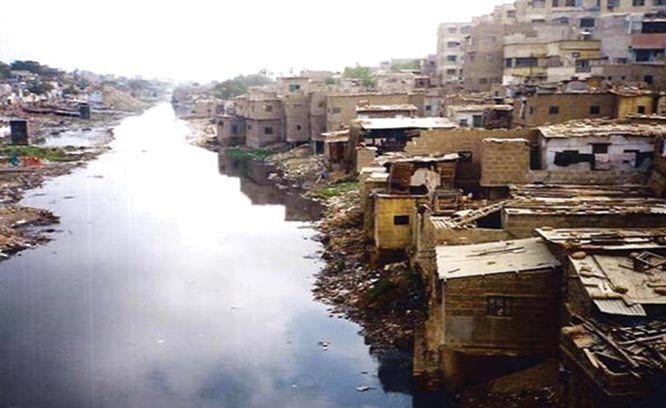
Tracing the history of various criminal gangs of Lyari long before the crackdown of law enforcers and their latest victory -- the killing of notorious commander Ghaffar Zikri

It was early morning of October 4 when the entire area of Ali Muhammad Mohallah in Karachi’s Lyari neighbourhood echoed with the exchange of heavy gunfire between gangsters and law enforcement personnel for several hours. Police raided the area on a tip-off provided by an intelligence agency about the presence of Ghaffar Zikri, a notorious gang commander, who had eluded law enforcers for around 18 years. Zikri, along with his three-year-old son and an associate, was killed in the shootout with the police.
Zikri’s killing is a great victory in the law enforcers’ crackdown on the gangs. As for the residents of Lyari, they see peace limping back to the area with the killing of another key gang commander.
Since the launch of a Rangers-led operation in September 2013, the killing and arrest of the commanders and militants have weakened most criminal gangs. The Lyari’s gang-world’s main characters, such as Rehman Dakait, Arshad Pappu, Baba Laadla and Uzair Baloch have either been arrested, killed in police shootouts or in skirmishes among gangs.
The October 4 killing of Zikri has weakened the power of the gangs even more.
Samiullah Soomro, a senior police officer overseeing Lyari area, says that Zikri was wanted in several dozen criminal cases and the provincial government had announced Rs2.5 million reward for his arrest. "We received information that for the last one week Zikri had frequently been visiting Lyari in an attempt to ‘regroup’ his gang," Soomro tells TNS.
However, local security analysts covering Lyari believe that despite Zikri’s elimination, two other gangs, led by Zahid Ladla (brother of the slain Baba Ladla) and Wasiullah Lakho, were still active in Lyari. Both of them, they specify, operate from outside.
Lyari, one of the oldest areas of Karachi, was famous for its multi-ethnic and cultural harmony until criminal gangs made inroads into the locality. Although gangs and gang wars in Lyari have been common since the 1960s, the present-day conflict dates back to the ’90s. After becoming a haven for these numerous gangs, it has remained troubled by violent rivalries between the gangs seeking to expand their control over a variety of illicit markets including extortion, theft, drugs, kidnappings for ransom and assassinations.
All gangs preyed on the Lyari residents even as they recruited from among them. They had also formed alliances for mutual advantage with political parties; the gang providing the party muscle power while the party, in turn, would offer immunity and ‘facilitation’ services to them. The combination had, at times, been literally deadly. Consequently, Lyari’s residents were subjected to considerable violence over the years and the area gained a reputation for thuggery.
Initially, the criminal groups -- one headed by Shair Muhammad alias Sheru and the other by Daad Muhammad alias Dadul -- comprised mainly unemployed youth and indulged in street crimes such as handbags snatching and other minor crimes.
In the 1980s, the groups started pushing drugs, owing to the high returns in this illegal business. Initially, both groups divided the area for carrying out their operations. But conflicts between the groups emerged when they tried to further their influence by treading on each other’s territory. At that time, members of these gangs were equipped with daggers and knives only; their fight seldom led to the loss of lives.
Tensions between the groups intensified when Haji Lalu joined the group of Dadul and became his right-hand man. Lalu is said to have revolutionised crime in Lyari by organising drug smuggling, kidnapping for ransom and, later, extortion.
Rehman Dakait, the notorious character of Lyari gangs, was Dadul’s son. However, from an early age, Dakait is said to have developed differences with Lalu and formed his own gang in 1998. After the arrest of Lalu in 2001, his son Pappu took charge of the gang. Although fighting between Dakait and Lalu’s gangs was nearly constant, it intensified in 2003 after the killing of Faiz Muhammad alias Mama Faizu, a transporter. Dakait blamed Pappu for the killing and provided protection to Uzair Baloch, Faiz Muhammad’s son. The violence between the two gangs was severe and hundreds turned up dead.
In 2005, the government asked notorious police officer Chaudhry Aslam to form the Lyari Task Force to stop the gangs but it failed badly. Both Dakait and Pappu were arrested in 2005, though the latter escaped and was arrested again in 2006. In the same year, Dakait managed to escape. He returned to the area and reorganised his operations. In 2007, he altered his business model: Instead of preying on his own people in Lyari, he started extorting the businessmen and wealthy individuals outside of Lyari, especially those located in the Old City Area. He also began welfare activities and charity work in Lyari under the banner of the People’s Aman Committee (PAC) and developed relations with the Pakistan People’s Party, which used the gang to counter the Muttahida Qaumi Movement’s efforts to make inroads in Lyari and nearby towns.
After Dakait was killed in a shootout with police officer Aslam, in August 2009, Uzair Baloch became his successor and served as the PAC’s public face and political representative, while Baba Ladla continued as the PAC’s operational commander. Meanwhile, Zikri left the PAC and joined hands with the rival gang leader Pappu, who along with his brother Yasir Arafat, was killed in a brutal way by Uzair’s group in March 2013.
However, after the launch of the Rangers-led citywide operation against violent groups in September 2013, gangs started weakening. Law enforcement agencies took serious action against these networks by killing and arresting their key leaders through its intelligence network across the neighbourhood.